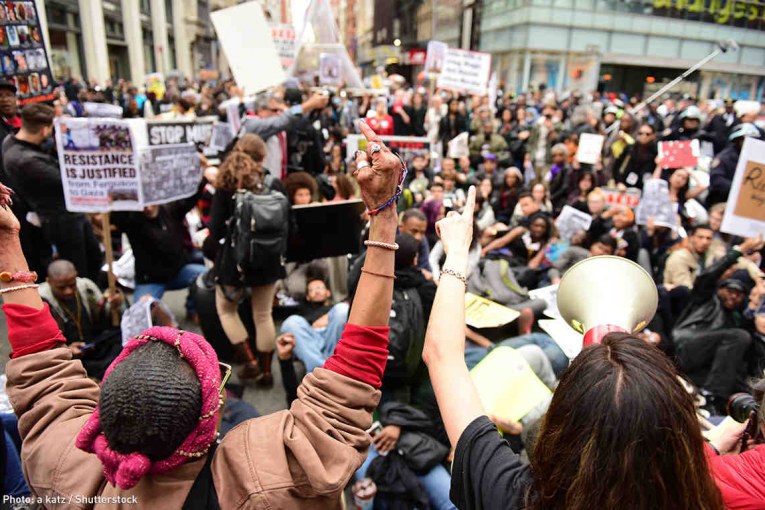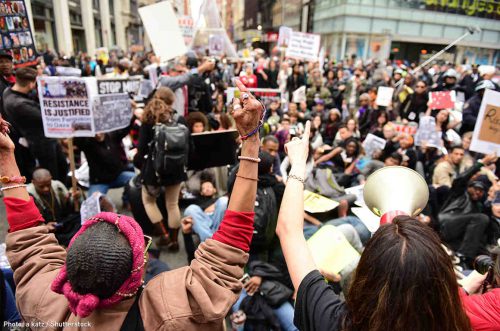
 By Mat dos Santos
By Mat dos Santos
The United States government considered Nelson Mandela a terrorist until 2008. Mandela was a designated terrorist 18 years after he was released from prison, 15 years after he won the Nobel peace prize, and 14 years after he was elected president of South Africa.
Let that sink in for a moment.
In 1962, the U.S. government considered Mandela to be “the most dangerous communist” outside of the then Soviet Union. It was subsequently revealed that a CIA agent provided the South African government with the information necessary to apprehend him and land him in prison for 27 years.
The indignity suffered by Mandela during every visit to the United States — as a “terrorist” he had to get special clearance to enter the country — was finally wiped clean by an act of Congress just five years before he died.
Nelson Mandela, and his organizing in South Africa, was not protected by the First Amendment, a freedom afforded by the U.S. Constitution only to those in the United States. But we should not forget that Angela Davis, Malcom X, and yes, even the now-beloved Martin Luther King, Jr., were at varying times labeled enemies of the state during their struggle against segregation in the United States. The First Amendment protected their organizing. But it did not stop our federal law enforcement agencies from watching, labeling, and arresting them. We are fortunate that these heroes of racial justice did not cower when faced with jail time, but instead spoke louder.
Earlier this week, we learned that people in Portland organizing against police killings of Black men, white nationalist politicians, and the countless systems of racism throughout our local, state, and federal governments are now considered “domestic terrorists” by Department of Homeland Security. Why? Because the Portland Police Bureau labeled the November 10, 2016 protest a “riot.”
At the time, we criticized the then-mayor’s call for an end to protest in Portland. We knew the indiscriminate use of the term “riot” was dangerous. It is counterproductive when people express their anger and frustration with violence and vandalism, but these events do not justify the silencing of peaceful protest or the labeling of organizers of peaceful protests criminals.
A little over a week ago, ACLU of Oregon staff met with Mayor Wheeler and Chief Marshman to discuss the disproportionate and dangerous response by Portland Police on President’s Day and prior protests. Our conversation was tense when we argued about whether “riots” occurred in Portland. Mayor Wheeler defended the city’s decision to call the protest a riot. I doubt he knew that his insistence on using this term for vandalism at the hands of a few people — out of several thousand peaceful protesters — would land his city in a Homeland Security report and earn our activists the label “domestic terrorists.”
This proves a simple point: Words matter. And when they are put into a report that is disseminated to law enforcement agencies across the country through enigmatic DHS Fusion Centers, they matter a lot. Fusion Centers, located throughout the nation, serve as a hub of information sharing for local, state, and federal law enforcement. They were created in the wake of the September 11, 2001 attacks as a way to share information about terrorism. Under the cover of “national security,” they have little oversight. For whatever protection they have provided the public, they have also sown distrust about their ability to discern actual threats.
Last year, Oregonians were shocked to learn that an agent in the Oregon Department of Justice searched Twitter for the hashtag “Black Lives Matter” and used results to determine that the head of the DOJ’s Civil Rights Division was a potential threat to the police. The agent decided to search for the hashtag Black Lives Matter, at least in part, because of a report disseminated by the Fusion Center that warned law enforcement of scheduled Black Lives Matter protests. The implication was that these protests may be a threat against the lives of law enforcement. This was racial bias spread through a nationwide system with little oversight resulting in a horrible mistake. The Oregon DOJ’s director of civil rights was not targeting police — he was sharing the cover of a hip hop album.
It is hard to know the future implications of labeling Portland protests “riots” or protesters “domestic terrorists,” but the parallels to the actions of our government in the 1960s should give us pause. The surveillance, labeling, and incarceration of protesters, especially Black protesters, because of their alleged criminal or terrorist activity is a well-worn trope. And while it may not surprise, it should still shock.
The impact of unchecked law enforcement rhetoric threatens our precious right to speak out against oppressive government. We must demand that our local leaders respect this right as we see those who lead our federal government erode it without hesitation.
Mat dos Santos is Legal Director of ACLU of Oregon
https://www.washingtonpost.com/news/wonk/wp/2017/02/24/
I understand the need for protests to remain peaceful. I respect the need for protection of the right to use of roadways and property. However, there is one aspect of some of these bills that is deeply troubling to me. That is the right of seizure of property of protest organizers if there is vandalism or harm caused during a protest that subsequent to peaceful organization, then becomes violent, sometimes at the hands of those who oppose the protest. It is clear to me that the intent here is not to protect either our constitutional right to protest, nor property nor right of usage. The intent is to inhibit the practice of our right to free speech and to associate freely.
These types of laws have the makings of an authoritarian society and should be rejected and/or resisted.
Funny but it appears you didn’t feel that way when campus conservatives wanted to have their free speech event inviting Milo to speak. How did you put it? ” a need for acceptance of the consequences.”
That’s pretty vague though – what is the appropriate consequence might be a much bigger question
It is hard to know what she might have been thinking when she said “consequences”, but the UC Davis Republicans being remembered for mocking pepper sprayed protesters seems like a terrible enough consequence to me. On second thought, I think the consequence is too severe.
Kieth
There is no discrepancy here. I fully believe that individuals should be responsible for their own actions, not those of others. If organizers of a peaceful protest against POTUS were warned in advance that police had information available that violent activity was imminent, then I believe that they should call off their portion of the demonstration in order to prevent escalation from their own supporters. Then they should be held blameless for violence perpetrated by others just as the College Republicans were held blameless after the Milo cancellation.
I was just going by your own words as written. You are always big on that when it comes to Trump and other conservative politicians. Your own words stated “a need for acceptance of the consequences.”
Great news! Can they add AntiFa to the list ASAP!
I agree. I never understand why there never seems to be much consequence for the actions of protestors like Antifa. They need to be rounded up when they’re hurting people and destroying property and pay for their actions with both jail time and monetary compensation.
PArt of the problem is the difficulty in improving individual culpability
Keith
“Your own words stated “a need for acceptance of the consequences.”
The consequences for which I advocated were known to the College Republicans and were reported as being payment for damage sustained. I already said that I would support the same if anti POTUS protestors proceeded with a protest that they knew was at risk of causing damage having been warned in the same fashion by the police. So what exactly do you see as inconsistent in my positions.